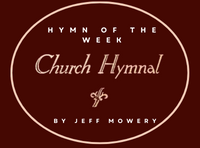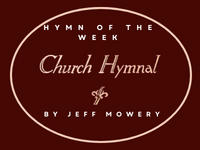There is a Balm in Gilead
Chorus
There is a balm in Gilead
To make the wounded whole;
There is a balm in Gilead
To heal the sin-sick soul.
Sometimes I feel discouraged,
And think my work’s in vain,
But then the Holy Spirit
Revives my soul again.
Don’t ever feel discouraged,
for Jesus is your friend,
and if you look for knowledge
He’ll ne’er refuse to lend.
If you can’t preach like Peter,
If you can’t pray like Paul,
Just tell the love of Jesus,
And say He died for all.
This week’s hymn has both an interesting inspiration and an unknown origin. It’s inspiration comes, like many great old hymns, from an obscure question found in Jeremiah 8:22 which reads “Is there no balm in Gilead, Is there no physician there?” Jeremiah asks a question thousands of years ago, and the author of the hymn answers that question emphatically by saying “There is a balm in Gilead” and His name is Jesus. What is unique about this hymn/spiritual’s origin is that there is no known author attribution. It’s words appear in hymns in the 1800’s, and appear to have been merged from other older hymns which was not uncommon for spirituals from America 200+ years ago. Part of the lyrics appear to come from John Newton’s writing (the author of Amazing Grace). Newton wrote:
“How lost was my condition
Till JESUS made me whole!
There is but one Physician
Can cure a sin–sick soul.”
There is another red-back hymnal song (“Hide Thou Me”) begins:
“Sometimes I feel discouraged….and I think my work in vain….
I’m tempted oft to murmur, to grumble, and complain….
But when I think of Jesus…and what He’s done for me…..
Then I cry to the Rock of Ages…..Hide Thou me…..”
So, I can’t speak definitively on the author or origin of this hymn, but what I can do is speak definitively about the answer to Jeremiah’s question. Is there no balm in Gilead? Oh yes, there’s a balm in Gilead!! For that balm has cleansed and healed my sin-sick soul. And that balm has been applied to millions of hearts throughout the ages, and that balm is still available today to heal the sin-sick soul.
Couple of comments on the lyrics:
- “Sin-sick soul” – This phrase reminds of Jesus’ healing of the paralytic in Matthew 9. The people bring a paralytic to Jesus. He sees their faith, and He responds by saying “Your sins are forgiven.” This infuriated the scribes. How can this man claim to forgive sins? Jesus, knowing their thoughts, does something amazing. He proves His authority by healing the man of his physical illness as well. This song reminds us that Jesus can make the wounded whole, and can heal the sin-sick, and physically sick, soul as well.
- “If you look for knowledge, He’ll never refuse to lend” – This phrase reminds me of James words in James 1:5. “But if any of you lacks wisdom, let him ask of God, who gives to all generously and without reproach, and it will be given to him.” So who does God give wisdom to? Anyone who lacks and asks. How does God give His wisdom? The verse in this song says He lends it. I believe He gives it. Generously. Not looking for repayment. But gives to the one who asks – freely, abundantly, generously, pressed down and shaken together, and without reproach.
In researching this hymn, I came across something very interesting, at least very interesting to me. There is a famous poem written by Baltimore’s own Edgar Allen Poe that many of you will remember. It is the poem “The Raven” the namesake of the NFL team – The Baltimore Ravens. The most famous line from this poem is repeated over and over, and is “Quoth the Raven, Nevermore.” This poem, like many of Poe’s works, is very dark. What is interesting is that in a later stanza in this poem, Poe actually quotes from Jeremiah 8 himself when he writes ” Is there—is there balm in Gilead?—tell me—tell me, I implore” Quoth the Raven “Nevermore.” I will admit, I personally haven’t done a complete analysis of Poe’s exposure to Christianity or what his beliefs, or lack thereof, were about God. I cannot tell you if he was a student of the Word, or one that was merely around the Word and had a familiarity with Christian doctrine. The darkness of his writings, however, cannot be argued.
Poe was, however, in this famous poem asking essentially that most important question. Is there a balm in Gilead? Is there someone who can heal my sin-sick soul? Is there someone that free me from the shackles and chains of sin in my life? I want to leave you a quote from the Edgar Allen Poe Society of Baltimore’s website about his religious beliefs:
“It would certainly have been understandable if Poe had lost confidence in a divine hand, one that directs our daily lives for purposes of our own spiritual benefit. The sad and youthful deaths of so many loved ones (his mother, Mrs. Stanard, Frances Allan, his brother and especially the long and lingering illness of Virginia) would have tested anyone’s faith. Poverty, illness and failure no doubt seemed his constant companions. If we can accept the testimony of Dr. John Moran, which generally must be taken with more than a little scepticism, Poe’s last words were “Lord, help my poor soul.”
I am reminded of two types of people Jesus talked about in Luke 18. “Also He spoke this parable to some who trusted in themselves that they were righteous, and despised others: “Two men went up to the temple to pray, one a Pharisee and the other a tax collector. The Pharisee stood and prayed thus with himself, ‘God, I thank You that I am not like other men—extortioners, unjust, adulterers, or even as this tax collector. I fast twice a week; I give tithes of all that I possess.’ And the tax collector, standing afar off, would not so much as raise his eyes to heaven, but beat his breast, saying, ‘God, be merciful to me a sinner!’ I tell you, this man went down to his house justified rather than the other; for everyone who exalts himself will be humbled, and he who humbles himself will be exalted.”
If on his death bed, Edgar Allen Poe repented of his sin, and believed in the Lord Jesus Christ as His savior, then he went down to his house justified. We can answer this question for Him – There is a balm in Gilead. To heal the sin-sick soul. Quoth the Christian – Evermore!!!

